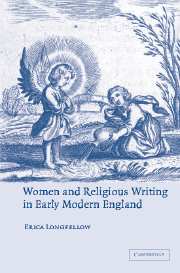Book contents
- Frontmatter
- Contents
- Acknowledgements
- Abbreviations
- Note on transcription and citation
- Introduction
- 1 ‘Blockish Adams’ on mystical marriage
- 2 Ecce homo: the spectacle of Christ's passion in Salve deus rex judæorum
- 3 Serpents and doves: Lady Anne Southwell and the new Adam
- 4 Public worship and private thanks in Eliza's babes
- 5 Anna Trapnel ‘sings of her Lover’
- 6 The transfiguration of Colonel Hutchinson in Lucy Hutchinson's elegies
- Conclusion
- Bibliography
- Index
- Index to scripture passages
Introduction
Published online by Cambridge University Press: 22 September 2009
- Frontmatter
- Contents
- Acknowledgements
- Abbreviations
- Note on transcription and citation
- Introduction
- 1 ‘Blockish Adams’ on mystical marriage
- 2 Ecce homo: the spectacle of Christ's passion in Salve deus rex judæorum
- 3 Serpents and doves: Lady Anne Southwell and the new Adam
- 4 Public worship and private thanks in Eliza's babes
- 5 Anna Trapnel ‘sings of her Lover’
- 6 The transfiguration of Colonel Hutchinson in Lucy Hutchinson's elegies
- Conclusion
- Bibliography
- Index
- Index to scripture passages
Summary
The poetry of Lady Anne Southwell (1574–1636) would startle anyone who believes that early modern women were constrained to be always chaste, silent and obedient. Southwell's lyrics, which she and her husband together collected into a manuscript book, were particularly critical of how men manipulated gender roles in order to keep women in their place. Consider the following poem:
All.maried.men.desire.to.haue good wifes:
but.few.giue good example. by thir liues
They are owr head they wodd haue vs thir heles.
this makes the good wife kick the good man reles.
When god brought Eue to Adam for a bride
the text sayes she was taene from out mans side
A simbole of that side, whose sacred bloud.
flowed for his spowse, the Churches sauinge good.
This is a misterie, perhaps too deepe.
for blockish Adam that was falen a sleepe[.]
Poor Adam frequently takes a beating in Southwell's poetry, as a symbol of all that is obstinate and foolish about men who crave power over women but do not understand the responsibility that comes with it. These men force women to be ‘good wifes’, to follow the command of St Paul's epistle to the Ephesians that wives must submit themselves to their husbands; but they refuse to follow the moral standard Paul sets for husbands, that they must love their wives to the point of self-sacrifice. Instead these husbands simply force their wives to obey, and if their wives rebel, Southwell's poem suggests, it is the husbands' own fault.
- Type
- Chapter
- Information
- Women and Religious Writing in Early Modern England , pp. 1 - 17Publisher: Cambridge University PressPrint publication year: 2004



